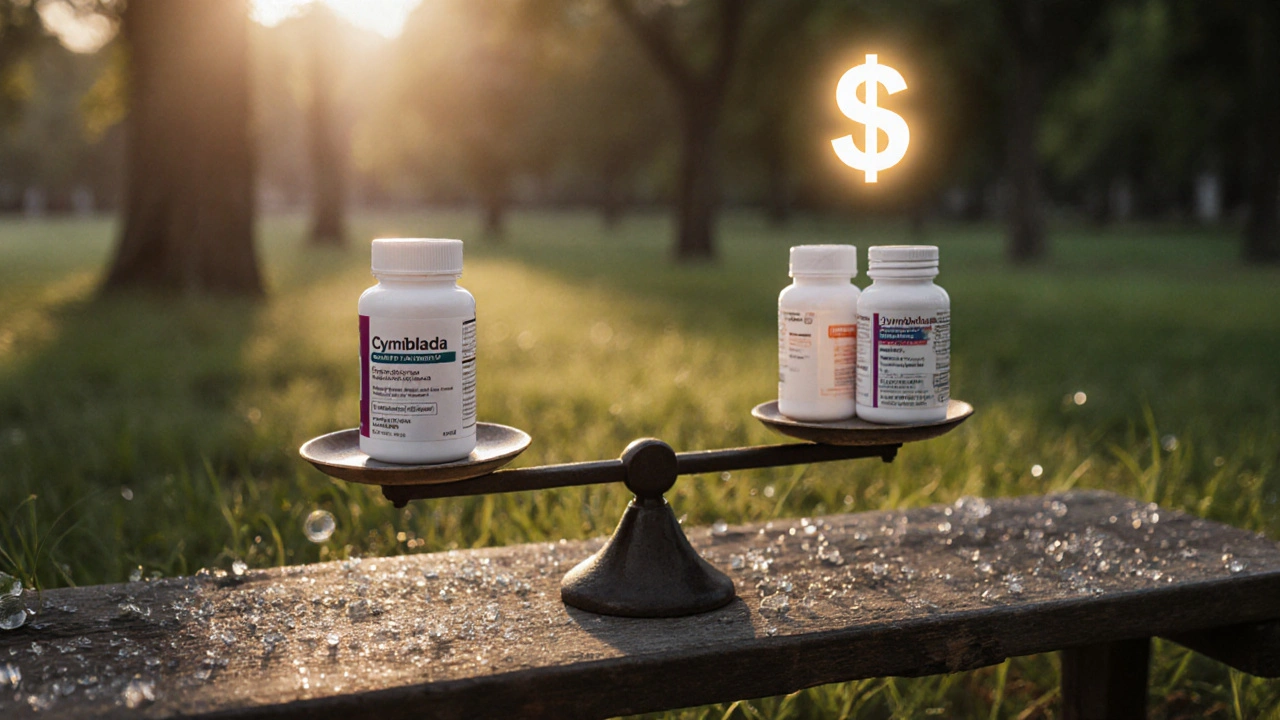Cymbalta vs Alternatives: Find the Right Antidepressant for You
 Sep, 28 2025
Sep, 28 2025
Antidepressant Comparison Tool
Personalize Your Search
Recommended Medication
When you’ve been handed a prescription for Cymbalta (duloxetine) and wonder whether another medication might suit you better, the first step is to understand how it stacks up against the most common options.
Key Takeaways
- Cymbalta is an SNRI effective for depression, anxiety, and certain pain conditions.
- Sertraline and Escitalopram are SSRIs with lower sexual side‑effect rates.
- Venlafaxine offers strong anxiety relief but can raise blood pressure at high doses.
- Bupropion is energizing and weight‑neutral, but less helpful for anxiety.
- Amitriptyline is a cheap, older tricyclic useful for chronic pain, yet it carries anticholinergic risks.
How Cymbalta Works and What It Treats
Cymbalta belongs to the selective serotonin‑norepinephrine reuptake inhibitor (SNRI) class. By blocking the reabsorption of both serotonin and norepinephrine, it boosts the levels of these neurotransmitters in the brain, improving mood and pain perception.
Approved uses include major depressive disorder (MDD), generalized anxiety disorder (GAD), diabetic peripheral neuropathic pain, fibromyalgia, and chronic musculoskeletal pain. The typical adult dose starts at 30mg daily and may be increased to 60mg or 120mg depending on the condition.
What to Compare When Choosing an Antidepressant
Switching from or considering an alternative to Cymbalta isn’t a decision to take lightly. Below are the six criteria that most patients and clinicians weigh:
- Efficacy for the primary condition - Does the drug lift mood, calm anxiety, or relieve pain as needed?
- Side‑effect profile - Which adverse effects are tolerable for you?
- Onset of action - How quickly can you expect improvement?
- Dosing convenience - Once‑daily versus multiple doses, need for titration.
- Withdrawal and discontinuation syndrome - How smoothly can you stop the medication?
- Cost and insurance coverage - Generic availability and out‑of‑pocket expense.

Top Alternatives to Cymbalta
Here’s a quick snapshot of the most frequently mentioned substitutes. Each entry introduces the drug with microdata on first mention.
| Medication | Class | Key Indications | Typical Starting Dose | Common Side‑Effects | Notable Pros | Notable Cons |
|---|---|---|---|---|---|---|
| Cymbalta | SNRI | Depression, GAD, neuropathic pain, fibromyalgia | 30mg once daily | Nausea, dry mouth, insomnia, sexual dysfunction | Effective for both mood and pain | Potential withdrawal, higher cost than older drugs |
| Sertraline | SSRI | Depression, GAD, PTSD, OCD | 50mg once daily | GI upset, insomnia, sexual dysfunction (less than SNRI) | Well‑tolerated, inexpensive generic | Less effective for chronic pain |
| Venlafaxine | SNRI | Depression, GAD, panic disorder | 37.5mg once daily | Elevated blood pressure, nausea, sweating | Strong anxiety control | Blood‑pressure monitoring required at higher doses |
| Bupropion | NDRI | Depression, smoking cessation, ADHD adjunct | 150mg once daily (max 450mg) | Dry mouth, insomnia, rare seizures | Weight‑neutral, energizing, low sexual side‑effects | May aggravate anxiety, seizure risk at high dose |
| Amitriptyline | Tricyclic antidepressant (TCA) | Depression, chronic neuropathic pain, migraine prophylaxis | 25mg at bedtime | Dry mouth, constipation, drowsiness, cardiac effects | Cheap, good for pain | Anticholinergic side‑effects, overdose risk |
| Escitalopram | SSRI | Depression, GAD | 10mg once daily | Nausea, fatigue, sexual dysfunction (low incidence) | Very tolerable, fast onset (2‑3 weeks) | Limited pain relief |
Which Alternative Fits Which Situation?
Below is a quick guide on when each drug might be the smarter choice.
- If pain relief is a priority - Cymbalta or Amitriptyline usually win because they target both mood and nerve pain.
- If you’re sensitive to sexual side‑effects - Bupropion and Escitalopram tend to have the lowest rates.
- When anxiety spikes - Venlafaxine and Sertraline are often preferred; Venlafaxine’s norepinephrine boost can calm severe worry.
- Budget concerns - Generic SSRIs (Sertraline, Escitalopram) and Amitriptyline cost pennies per tablet.
- History of heart issues - Stay away from Amitriptyline; stick with SSRIs or low‑dose Cymbalta.
- Need to quit smoking - Bupropion has dual action for cessation.
Switching Safely: Practical Steps
Never stop Cymbalta abruptly. A typical taper looks like this:
- Reduce the dose by 30mg every 1‑2 weeks (or as your doctor advises).
- Monitor for withdrawal symptoms: dizziness, flu‑like feelings, irritability.
- When the dose is low enough (usually 30mg), start the new medication at its recommended low dose.
- Maintain a symptom diary for the first month of the new drug.
Always coordinate the switch with a prescriber, especially if you’re moving between an SNRI and an SSRI, because overlapping serotonergic activity can trigger serotonin syndrome.
Cost Snapshot (2025 US Data)
Average monthly out‑of‑pocket price for a 30‑day supply (brand‑name or generic) when insurance covers 80%:
- Cymbalta (generic duloxetine): $40
- Sertraline: $12
- Venlafaxine: $15
- Bupropion: $18
- Amitriptyline: $8
- Escitalopram: $10
These numbers can vary by pharmacy and insurance plan, but they give a sense of the price spread.

Frequently Asked Questions
Can I take Cymbalta with an SSRI?
Combining two serotonergic drugs raises the risk of serotonin syndrome, a potentially serious condition. Only a psychiatrist should consider such a combo, and it’s usually for short‑term augmentation under close monitoring.
What’s the biggest difference between Cymbalta and Venlafaxine?
Both are SNRIs, but Venlafaxine’s norepinephrine effect kicks in at higher doses, which can raise blood pressure. Cymbalta has a steadier dual‑action across its usual dose range.
Is Bupropion safe for someone with anxiety?
Bupropion can actually heighten anxiety in some people because it’s stimulating. If anxiety is a primary concern, many clinicians start with an SSRI or SNRI first.
Do I need to do blood tests before switching?
Baseline labs (liver enzymes, kidney function) are useful, especially for duloxetine which is processed by the liver. Your doctor may repeat them after a few weeks on the new drug.
Which drug is best for weight gain concerns?
Bupropion is the most weight‑neutral, and some people even lose a few pounds. Amitriptyline and some SSRIs can cause modest weight gain.
Choosing the right antidepressant isn’t a one‑size‑fits‑all decision. By comparing efficacy, side‑effects, cost, and personal health factors, you can find a Cymbalta alternatives plan that feels right for you. Talk openly with your prescriber, keep a symptom journal, and give each medication a fair trial - usually 6‑8 weeks - before deciding what works best.
jamie sigler
September 29, 2025 AT 21:07Cymbalta made me feel like a zombie with a side of nausea. Switched to sertraline and now I can actually enjoy coffee without wanting to cry. Also, my libido came back. Who knew?
Also, why is everyone acting like this is rocket science? It’s just meds. Try one, if it sucks, try another.
Bernie Terrien
September 30, 2025 AT 00:25Cymbalta’s a corporate shill disguised as a pill. SNRIs are just serotonin glue with a side of hypertension drama. Bupropion? That’s the only one that doesn’t make you feel like a damp sock. And don’t get me started on amitriptyline-ancient, toxic, and cheaper than your therapist’s hourly rate. Classic pharma bait-and-switch.
Jennifer Wang
September 30, 2025 AT 12:07It is imperative to underscore that antidepressant selection must be individualized based on comorbidities, hepatic metabolism, and risk profiles. For instance, duloxetine carries a boxed warning for hepatotoxicity, and its SNRI mechanism may exacerbate hypertension in susceptible individuals. SSRIs such as escitalopram demonstrate superior tolerability in elderly populations due to reduced anticholinergic burden. Furthermore, abrupt discontinuation of SNRIs is associated with a 70% incidence of discontinuation syndrome, necessitating a structured taper over 4–8 weeks. Always consult a psychiatrist prior to regimen changes.
stephen idiado
October 1, 2025 AT 15:17Everyone’s obsessed with SSRIs like they’re holy water. Meanwhile, the real issue is the gut-brain axis. No one talks about microbiome disruption from these drugs. You’re not treating depression-you’re poisoning your vagus nerve. Amitriptyline? That’s just sedation with a side of delirium. Bupropion’s the only one that doesn’t turn you into a passive-aggressive blob. But even that’s a placebo wrapped in neurochemistry.
Subhash Singh
October 3, 2025 AT 14:19Could you please elaborate on the pharmacokinetic differences between duloxetine and venlafaxine regarding CYP2D6 metabolism? Additionally, is there any peer-reviewed data comparing the long-term cognitive effects of chronic SNRI use versus SSRIs in patients over 50? I am particularly interested in executive function metrics across a 2-year horizon.
Geoff Heredia
October 4, 2025 AT 04:38They don’t want you to know this, but Cymbalta was designed by Big Pharma to keep you dependent. The withdrawal symptoms? That’s not withdrawal-it’s a trap. They make you feel awful so you’ll keep buying. And why is amitriptyline so cheap? Because it’s been around since the 70s and they don’t need to advertise it. They’re selling you a lifestyle, not treatment. Check the patent dates. Everything’s rigged.
Tina Dinh
October 5, 2025 AT 07:05OMG YES!! 🙌 I was on Cymbalta for 2 years and felt like a robot crying in the shower 😭 Switched to bupropion and now I run marathons and remember my kids’ names!! 🏃♀️💖 Also, the cost difference? I saved $300/month!! Thank you for this guide!! 💕
Andrew Keh
October 7, 2025 AT 07:02Thanks for laying this out clearly. I think the most important thing is giving each medication time-6 to 8 weeks is realistic. I tried switching too fast before and ended up worse. Also, cost matters a lot, especially if you’re on a fixed income. Generic sertraline at $12 is a game-changer. Just make sure to talk to your doctor before changing anything.